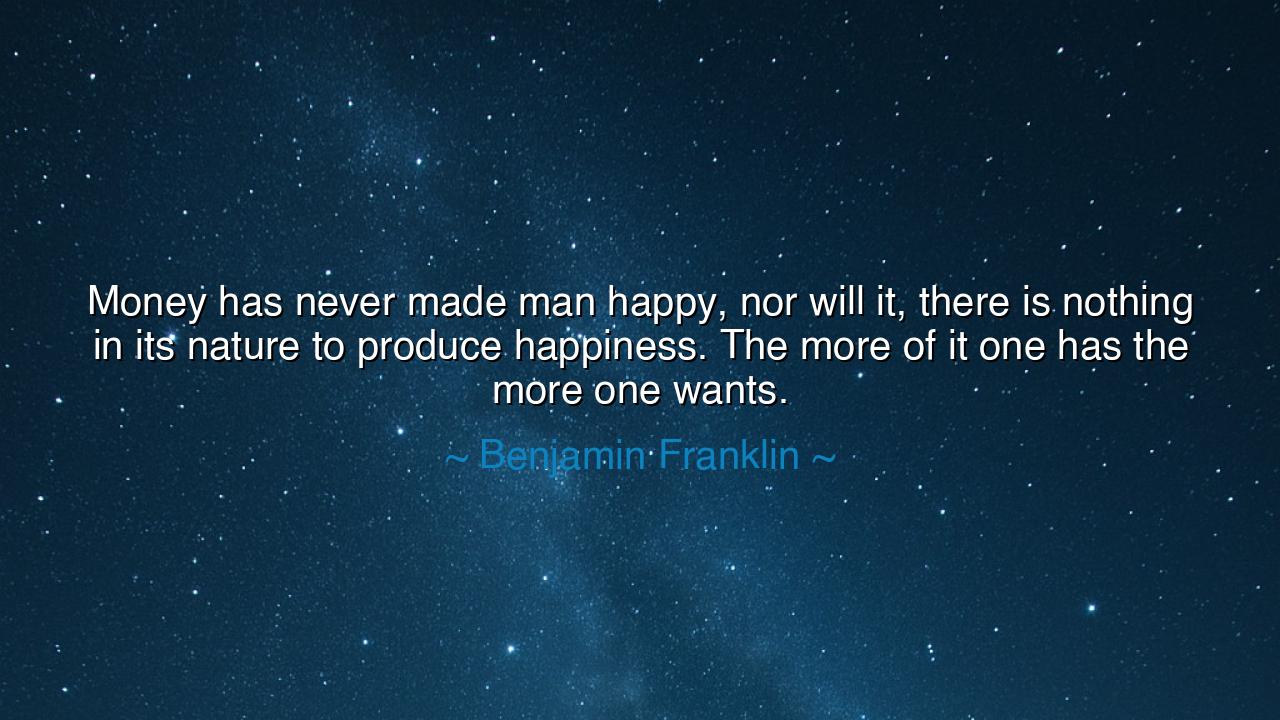
Money has never made man happy, nor will it, there is nothing in
Money has never made man happy, nor will it, there is nothing in its nature to produce happiness. The more of it one has the more one wants.






The wise Benjamin Franklin, philosopher, inventor, and one of the great architects of liberty, once said: “Money has never made man happy, nor will it, there is nothing in its nature to produce happiness. The more of it one has the more one wants.” In this saying, Franklin, who himself knew both poverty and prosperity, reveals one of the timeless paradoxes of the human soul: that what we call wealth often leaves us poor in spirit, and what we call poverty may yet hold the seeds of peace. He does not condemn money itself, for it is but a tool—but he warns against the illusion that it can ever satisfy the deep hunger of the human heart.
The meaning of his words runs deep, like a river beneath the soil of life. Franklin saw that happiness is a harvest grown from the mind and the heart, not from the counting of coins. Gold can purchase comfort, but not contentment; it can buy company, but not love; it can purchase pleasures, but not peace. In the nature of money, he said, there is no power to make man happy, for it feeds the body’s desires but leaves the soul’s desires unfed. The soul longs not for possession, but for purpose—not for accumulation, but for alignment with truth. Thus, the man who believes happiness can be purchased is like one who drinks seawater: the more he drinks, the greater his thirst becomes.
Franklin’s wisdom arose not from disdain for wealth, but from experience. Born the fifteenth child of a poor Boston family, he rose by his own labor to wealth, fame, and influence. Yet even amid his success, he remained a student of the inner life. He observed that those who gained riches often lost rest, that ambition could devour joy, and that contentment dwells not in abundance, but in gratitude. “The more of it one has,” he said, “the more one wants,” for desire is a fire that consumes what it feeds upon. In this, Franklin anticipated the wisdom of the ages: that happiness is found not in having more, but in wanting less.
History bears witness to this truth in countless forms. Consider King Midas, the legendary monarch whose touch turned all to gold. What he thought a blessing soon became a curse; even his food, his daughter, his very life turned lifeless beneath the weight of his greed. His tale is not fantasy but parable—the eternal story of mankind’s bondage to desire. Or think of the Roman emperor Marcus Aurelius, ruler of the greatest empire on earth, who found his peace not in palaces or power, but in philosophy. He wrote, “A man’s happiness is not to be dependent on things that pass away.” Thus, from the poorest sage to the mightiest ruler, the wise have spoken with one voice: happiness is not found in wealth, but in wisdom.
And yet, Franklin’s warning is not against the possession of money, but against its possession of us. Wealth can serve noble ends—it can feed the hungry, build schools, heal the sick—but only when it is the servant, not the master. When money rules the heart, it turns the free man into a slave; when the heart rules money, it becomes a blessing. Franklin himself lived simply despite his fortune, spending his gains on learning, invention, and the betterment of mankind. He understood that the measure of a man’s worth lies not in his treasure, but in his temperance, his virtue, and his use of what he has.
The deeper lesson of his words calls us to look within. The pursuit of endless gain is not a hunger of the body, but a wound of the spirit—a longing for security, for meaning, for love. But these cannot be bought; they must be cultivated. The one who chases money to find peace will never rest, for peace is born only from contentment, and contentment comes from the acceptance of sufficiency. As the Stoics taught, “He who is not content with little will not be content with much.” Thus, Franklin’s wisdom harmonizes with the ancients: happiness is an inward art, a discipline of perception, a steady practice of gratitude for what is already ours.
So, what lesson can we draw for our own lives? It is this: do not despise wealth, but do not worship it. Let money serve your life, not rule it. Work with diligence, but rest with gratitude. Use what you have to bless others, for generosity multiplies joy, while greed multiplies sorrow. Each morning, look not to what you lack, but to what you possess—your breath, your loved ones, your freedom, your purpose. For these are riches beyond all price.
And remember always, as Benjamin Franklin teaches, that happiness is not hidden in gold or found in the future—it dwells here, in the quiet heart that knows enough is enough. The man who can walk through the world with gratitude is richer than any king. For he carries his treasure not in vaults or coffers, but within his own soul—a treasure that neither moth nor rust can destroy, and which time itself can never take away.






AAdministratorAdministrator
Welcome, honored guests. Please leave a comment, we will respond soon